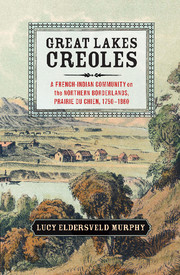'Lucy Eldersveld Murphy offers valuable insights into the assimilation of ethnic groups into American society in this major study of mixed-lineage Creole and indigenous people in the Great Lakes region. Using solid research and perceptive analysis, [she] provides an excellent account of the impact of land ownership, gender roles, and ethnic identification on the assimilation process, thus reconfirming her role as a leading scholar of Creole and mixed-lineage women in the Upper Midwest.'
R. David Edmunds - Watson Professor of American History, University of Texas, Dallas
'With new research and innovative analysis, Lucy Eldersveld Murphy has revealed a long-lasting and significant Creole world. Great Lakes Creoles demonstrates the distinctive cultural styles, racial mixing, and power of women that the fur trade left behind. Murphy’s fine-grained narrative of Prairie du Chien both convinces us that this world operated and enables us to care about the people she describes.'
Anne F. Hyde - William R. Hochman Professor of History, Colorado College
'Great Lakes Creoles offers a wonderfully nuanced history of Prairie du Chien, Wisconsin, from the perspective of its Native American and French founders, as they endured an overwhelming tide of Anglo-American colonization in the nineteenth century. Murphy has reconstructed the intertwined lives of multiethnic individuals and families, who avoided dispossession in their homeland by adjusting to their new minority status within it. Her analysis raises important questions about race and identity in America’s borderlands well beyond the Great Lakes.'
Timothy Shannon - Gettysburg College, Pennsylvania
'An enjoyable and thought-provoking window into a community whose survival, much on its own terms, disrupts the more common narratives of US expansion through exclusion of those deemed ‘non-white’ or the vanishing of indigenous predecessors and populations. Murphy succeeds in bringing the Creoles to life through families like the Brisboises, the Antaya-Powers, and the Barrettes, and enticingly leaves strands, reminiscent of the Creoles’ enormous kin networks, for other scholars to pick up these stories and extend them beyond the beautiful bluffs of the upper Mississippi that are Murphy’s focus.'
Christian Ayne Crouch
Source: The American Historical Review
'Murphy raises interesting questions for the study of comparative settler colonialisms, arguing that Great Lakes Creoles retained a distinct ethnic but not racialized identity in the face of social stigma and legal pressure on their lands. Unlike southwestern Hispanics or Canadian métis, Murphy argues, Great Lakes Creoles retained control of privatized lands and therefore possessed political authority and were able to avoid the economic and legal disfranchisement that contributed to the racialization of many other groups in this period. Other productive comparisons include those with New England native groups who were racialized and rhetorically vanished by similar land encroachment in the nineteenth century.'
Maeve Kane
Source: The Journal of American History
'Lucy Murphy adroitly focuses her lens on the complex tale of Prairie du Chien, Wisconsin, a community peopled by Native Americans, French-Canadian fur traders, British soldiers, and eventually Americans (and even a few African Americans) after the American Revolution … Murphy is very careful to emphasize how important the community’s native beginnings were. Twentieth-century Prairie du Chien Creoles remained very conscious of their Native American connections. Murphy concludes that in the end, the town’s Creoles assimilated by joining the Anglo culture of politics, education, and religion, while deliberately keeping themselves apart in their own neighborhoods and therein retaining many Native communal traditions. They maintained their position by their impressive adaptability and, by adapting, managed to keep a 'white' status and hold on to land and life, long after 'official' Native American life in the town had been removed.'
Margo Lambert
Source: Ohio Valley History



